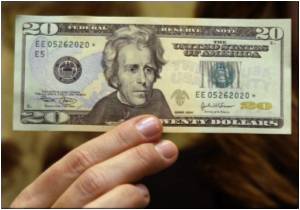A recent study has brought into light that cash receipts and paper money contain high levels of bisphenol A (BPA), a chemical linked to cancer, obesity and early puberty.

"Since BPA in thermal paper is present in a powdery film, we suspected it could easily travel from those receipts to other objects," says the study, led by Washington Toxics Coalition scientist Erika Schreder.
Holding the receipts for just 10 seconds caused up to 2.5 micrograms of BPA to transfer from the paper onto a person's fingers, and rubbing the receipts increased around 15-fold the amount of BPA transferred from the receipts onto fingers, the study said.
From the fingers, the BPA transferred easily onto dollar bills: the researchers found the chemical on 21 of 22 bills tested, although in much lower levels than on the till receipts.
More than 130 studies over the past decade have linked even low levels of BPA to serious health problems, including breast cancer, obesity and early onset of puberty.
The European Union last month followed Canada's lead and banned the use of BPA in baby bottles after tests showed the petroleum product can affect neural development and behavior in laboratory animals exposed to the chemical in the womb or very early in life.
Advertisement
Last month, the World Health Organization said BPA does not accumulate in the body, but admitted that "recent experimental and epidemiological studies found associations between low BPA exposure levels and some adverse health outcomes."
Advertisement
"BPA on receipts, dollar bills and in many other products is a direct result of the absurdly lax controls on chemicals in the United States," he said, calling on the incoming Congress to reform "the failed 1976 Toxic Substances Control Act."
The Rayburn Cafe in the US House of Representatives was one of the establishments where till receipts were found to have high levels of BPA, according to the study, which was published online by the two nonprofits.
Source-AFP














